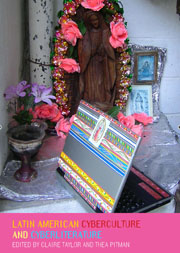Book contents
- Frontmatter
- Contents
- List of Illustrations
- Acknowledgements
- Foreword: Latin American Cyberliterature: From the Lettered City to the Creativity of its Citizens
- Notes on Contributors
- Introduction
- I Cyberculture and Cybercommunities
- 1 The New New Latin American Cinema: Cortometrajes on the Internet
- 2 Cyborgs, Cities, and Celluloid: Memory Machines in Two Latin American Cyborg Films
- 3 The Cyberart of Corpos Informáticos
- 4 Latin American Cyberprotest: Before and After the Zapatistas
- 5 Body, Nation, and Identity: Guillermo Gómez-Peña's Performances on the Web
- 6 Cyberspace Neighbourhood: The Virtual Construction of Capão Redondo
- 7 Literary E-magazines in Latin America: From Textual Criticism to Virtual Communities
- 8 Negotiating a (Border Literary) Community Online en la línea
- II Cyberliterature: Avatars and Aficionados
- A Cyberliterary Afterword: Of Blogs and Other Matters
- Conclusion: Latin American Identity and Cyberspace
- Suggested Further Reading
- Index
7 - Literary E-magazines in Latin America: From Textual Criticism to Virtual Communities
from I - Cyberculture and Cybercommunities
- Frontmatter
- Contents
- List of Illustrations
- Acknowledgements
- Foreword: Latin American Cyberliterature: From the Lettered City to the Creativity of its Citizens
- Notes on Contributors
- Introduction
- I Cyberculture and Cybercommunities
- 1 The New New Latin American Cinema: Cortometrajes on the Internet
- 2 Cyborgs, Cities, and Celluloid: Memory Machines in Two Latin American Cyborg Films
- 3 The Cyberart of Corpos Informáticos
- 4 Latin American Cyberprotest: Before and After the Zapatistas
- 5 Body, Nation, and Identity: Guillermo Gómez-Peña's Performances on the Web
- 6 Cyberspace Neighbourhood: The Virtual Construction of Capão Redondo
- 7 Literary E-magazines in Latin America: From Textual Criticism to Virtual Communities
- 8 Negotiating a (Border Literary) Community Online en la línea
- II Cyberliterature: Avatars and Aficionados
- A Cyberliterary Afterword: Of Blogs and Other Matters
- Conclusion: Latin American Identity and Cyberspace
- Suggested Further Reading
- Index
Summary
Communications theorist Joaquín María Aguirre Romero surmises that ‘the digital magazine cannot be an object in itself but rather an instrument servicing the diffusion of worthy content’ (Aguirre Romero 1999). Emphasising the new opportunities afforded by digital media, he calls for authors and editors of electronic publications to bear in mind the ‘important mission’ of e-publications, that of dissemination of information and widening access, and to approach new digital media with a ‘new mentality’, conceiving of e-magazines within new media itself, as opposed to traditional print models, and taking advantage of all the resources on offer. As Internet connectivity has increased rapidly across Latin America (Everett 1998; Stinson 1998; Muñoz 1999), so too has the development of new online publications. Individuals and groups in certain countries across the region are now working to take advantage of new technology and harnessing otherwise unavailable opportunities for information access and dissemination by means of e-magazines in particular. Elsewhere (Holdom 2005) I have argued that electronic publication has been notably embraced by the Latin American academic world: scholarly e-journals proliferate in Chile, Brazil, Argentina, Mexico, and Venezuela, for example, and publication of research in electronic form has overtaken that of some Western countries where a greater percentage of the population will be Internet users. In short, e-publication for a variety of fields – cultural and scientific – is booming in Latin America.
- Type
- Chapter
- Information
- Latin American Cyberculture and Cyberliterature , pp. 140 - 160Publisher: Liverpool University PressPrint publication year: 2007



